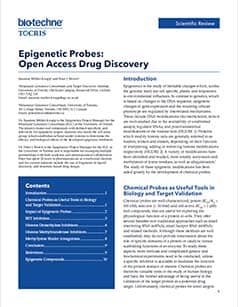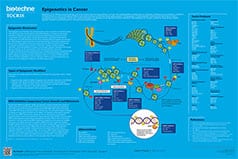WDR5
WD repeat-containing protein 5 (WDR5) is a chromatin associated protein found in multiple chromatin regulatory complexes. It serves as an adaptor protein for these complexes and is particularly associated with MYC transcription factor and MLL1, a methyltransferase.
WD repeat-containing protein 5 (WDR5) is a chromatin associated protein found in multiple chromatin regulatory complexes. Encoded by the WDR5 gene in humans, it serves as an adaptor protein for complex assembly.
Complexes containing WDR5 are involved in histone methylation and acetylation and chromatin remodelling. This protein is found in all 6 mammalian H3K4 methyltransferase complexes. In complex with MYC, an oncoprotein transcription factor, WDR5 is a key determinant for MYC recruitment to chromatin.
WDR5 is also found in complexes containing mixed lineage leukemia 1 (MLL1, also known as KMT2a), a methyltransferase and positive regulator of gene transcription. Specifically, MLL1 regulates the expression of genes responsible for self-renewal of hematopoietic stem cells. After differentiation, expression of these genes is turned off to prevent tumorigenesis. However, in leukemia translocation of MLL1 leads to the production of MML1 fusion proteins, which constitutively activate gene expression in differentiated cells leading to leukemogenesis.
External sources of pharmacological information for WDR5 :
Literature for WDR5
Tocris offers the following scientific literature for WDR5 to showcase our products. We invite you to request* your copy today!
*Please note that Tocris will only send literature to established scientific business / institute addresses.
Epigenetics Scientific Review
Written by Susanne Müller-Knapp and Peter J. Brown, this review gives an overview of the development of chemical probes for epigenetic targets, as well as the impact of these tool compounds being made available to the scientific community. In addition, their biological effects are also discussed. Epigenetic compounds available from Tocris are listed.
Epigenetics in Cancer Poster
This poster summarizes the main epigenetic targets in cancer. The dysregulation of epigenetic modifications has been shown to result in oncogenesis and cancer progression. Unlike genetic mutations, epigenetic alterations are considered to be reversible and thus make promising therapeutic targets.

